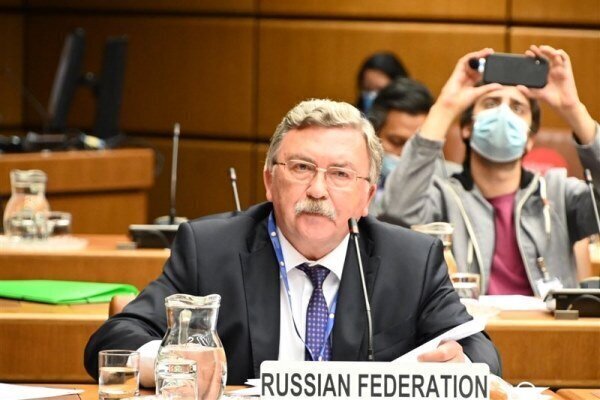Reviving JCPOA still possible: Russian diplomat

TEHRAN – The Russian envoy to the Vienna talks said on Friday that resuscitating the 2015 Iran nuclear is still possible even after the adoption of a censure resolution against Iran at the International Atomic Energy Agency's recent Board of Governors.
“It is too early to say that the situation has completely frozen, and that it has reached a dead end," Mikhail Ulyanov said in remarks to Russia 24, according to Al Alam.
Ulyanov added, "Maybe, we now need to try to revive the talks in some way, all this is not easy, of course, because after the adoption of the resolution, the Iranians will take an extra pause, I think."
The Russian diplomat pointed to the need to work on reviving the negotiation process, noting: "There are still opportunities, and at the same time, the IAEA secretariat and Iran should be encouraged to continue dialogue on the so-called outstanding issues."
On Wednesday, the Board of Governors of the International Atomic Energy Agency adopted a resolution on what it called Iran's insufficient cooperation with the international organization, claiming that Tehran had not provided sufficient explanations regarding the finding of traces of nuclear materials at three undeclared sites. Iran strongly rejected it.
In response, Iran announced the disconnection of the IAEA’s surveillance cameras installed at Iran's nuclear facilities, stressing that these cameras are not part of Tehran's commitment to the Safeguards agreement recently signed with the agency.
Iran said the shutdown of IAEA cameras is the first step and if the West continues its nonconstructive measures, it will take other retaliatory measures.
Iran first turned off nearly 20% of IAEA surveillance cameras that operated beyond the Safeguards agreement between Tehran and the UN nuclear watchdog. Then it announced the start of installing more advanced centrifuges.
Over the last few days, the West issued a barrage of strongly-worded statements criticizing Iran for its nuclear work in what appeared to be a concerted effort aimed at pocketing new concessions from Iran.
President Ebrahim Raisi underscored on Thursday that Iran would not budge from its stance in the wake of the adoption of the resolution against Tehran's nuclear program.
Raisi made the statements during a visit to Shahr-e Kord, the capital of Chaharmahal and Bakhtiari Province, a day after the IAEA's 35-nation Board of Governors passed the anti-Iran resolution submitted by the U.S., Germany, France, and the United Kingdom.
"How many times do you want to test the Iranian nation and not listen to the words of the country's officials? Do you think that we will retreat as a result of issuing of resolutions?” Raisi asked, referring to the drafters of the non-binding resolution.
“Iran will not take a step back from its positions,” he emphasized.
The president went on to say, "We will not stop and we will not tie the development of the country’s industry, agriculture and tourism to the frown and smile of the enemy."
“Our youths are bent to make the enemy desperate in the clash of wills,” Raisi stated, adding that the enemy does not want Iran to have access to nuclear industry, modern military and automotive industry, or profit from superior knowledge.
